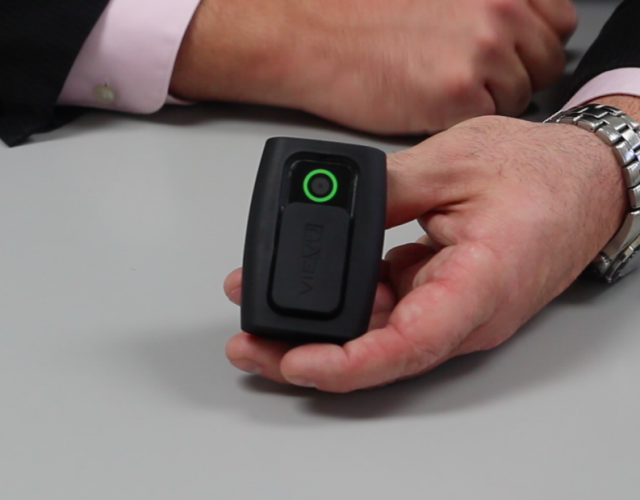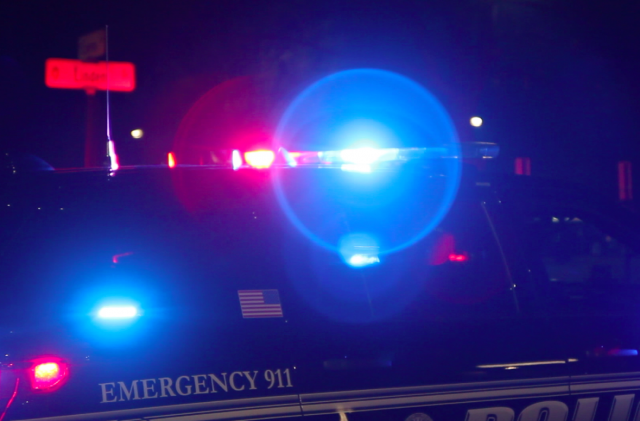






 One of the body worn cameras Madison police were considering using. (Melissa Behling/Madison Commons)
One of the body worn cameras Madison police were considering using. (Melissa Behling/Madison Commons)
This story is the first of a two-part series looking closely at the debate surrounding body camera use in the Madison Police Department, as well as the larger issues of systemic bias and community involvement. Part two will run next week.
Based on the community’s wishes, the Common Council decided against implementing body worn cameras for Madison police officers. The decision was made in mid-November after hearing presentations from the YWCA and the ad hoc committee appointed to study the benefits and drawbacks of the cameras.
The YWCA drew their conclusions from community engagement sessions in communities of color, who experience disparate police contact in Madison. They found these communities were not recommending body worn cameras. Their report states there was “broad agreement and a strong feeling that a BWV policy would not respond to concerns and fears about Madison policing.”
As part of the ad hoc committee, Captain Kristen Roman of MPD Community Outreach compiled a report on existing literature on body worn cameras and their potential benefits and drawbacks.
“The community wasn’t saying do or don’t get cameras,” Capt. Roman said. “The recurring theme was that we don’t trust police and we don’t trust that cameras would actually be used in a way that we can trust.”
The debate in Madison leading up to the Council’s decision exposed concerns about both body worn cameras and larger issues in police-community relations.
Madison sees a few advantages
Leland Pan, Dane County Board supervisor for District 5, said body worn video can provide more evidence in cases of police brutality. It also provides a way to corroborate complaints.
“There are also folks who hope this would also change police culture,” Pan said. “If [officers] know they are being watched and there is that accountability measure, they will be more cautious in their actions.”
Pan also said this footage could be useful to victims and eyewitnesses in court cases.
Capt. Roman’s report said that police agencies nationwide have implemented body worn cameras in efforts to increase transparency, accountability and trust. She emphasized that these three elements impact both the community and police officers.
Police departments who have already implemented body cameras, according to Capt. Roman’s report, have found several benefits: complaint reduction and resolution, transparency and accountability, improved public trust, evidence documentation, training and identifying systemic problems.
The Madison community believes addressing this final point – systemic problems – is more important than implementing a body worn video program.
“BWV can assist in identifying and addressing systemic problems within the problems within the department,” Capt. Roman wrote in her report. “Reviewing BWV footage as the need arises will provide opportunities to recognize patterns that may emerge from individual incidences and officer actions pointing to more wide-reaching structural problems in need of correcting.”
Captain Joe Balles and Capt. Roman both said the Madison Police Department wanted the decision to implement body cameras to be left to community members.
“I applaud Madison for listening to the community on this, especially those who are the most impacted,” Matthew Braunginn said. Braunginn is the co-founder of the Young Gifted and Black Coalition, a group dedicated to ending state violence against low-income communities of color.
From what he has heard, most people think the only benefit about body cameras is accountability.
“But I don’t really see it solving issues of accountability,” Braunginn said.
He referenced Eric Garner’s case. Despite video footage, the Staten Island grand jury’s brief deliberation found there was not enough evidence to charge the officer.
Braunginn also referenced the recent charges brought against a Chicago police officer for shooting 17-year-old Laquan McDonald. The officer was charged with first-degree murder, shooting at the teen for a total of 15 seconds – 13 of which McDonald had already fallen to the ground. Even with police dashboard footage as evidence, it took over a year after the incident to convict the officer.
 (Melissa Behling/Madison Commons)
(Melissa Behling/Madison Commons)
Body worn video disadvantages
“Most of the time video imagery isn’t going to lead to a conviction or even charges being brought,” Braunginn said.
Moreover, he pointed out, the raw footage is not without context and is open to interpretation. Braunginn cited Supreme Court case Graham v. Connor and said there also have been cases where police have doctored images and videos to falsify reports.
“When it comes to use of force, objective reasonableness [means] that the officer only has to feel that they are in danger and be frightened – that is upon the individual officer to say,” Braunginn said. “This means it is completely subjective, and especially when we bring implicit bias into it, that makes it completely unreasonable.”
Another major negative side of the police camera debate is the constant state of surveillance, Pan said.
“There may be officers who try to use discretion to avoid arresting folks,” he said. “This may tip their hand to say ‘I can’t ignore a minor crime because it’s on camera.’”
Capt. Balles of the Madison Police Department’s South District and restorative justice program also saw how video might change policing.
“One of the concerns is that if these video and audio recordings might actually be an imposition to our relations [with individuals from communities of color] feeling like they can approach us and share information with us confidentially,” Balles said.
Balles gave the example of community members feeling uncomfortable giving tips to police officers if they are being recorded. This adds to the Madison Police Department’s struggle to mend community relations since their outreach efforts sometimes have unintentional drawbacks.
But officer discretion and trust between the community and police don’t come to mind as the most important issues to activists in the Young Gifted and Black Coalition.
“We’re going to be spending millions of dollars nationwide in giving police another tool in their large and ever-growing tool bag that we keep spending money on instead of addressing the root causes of crime and poverty,” Braunginn said.
“The idea of fostering trust is really, kind of misplaced because the very institutions of policing are rooted in our oppression. It’s everything that’s wrong with the institution and everything that’s wrong with America that really needs to be addressed.”
|
|
|
Welcome to the Madison Commons, a website designed to provide news and information about all of Madison's neighborhoods and a crossroads for the discussion of community issues. The name comes from the idea of a village commons, a place for news, talk, debate, and some entertainment, too, that's open to everyone.
All rights reserved. Read more about the Madison Commons and its partners.

